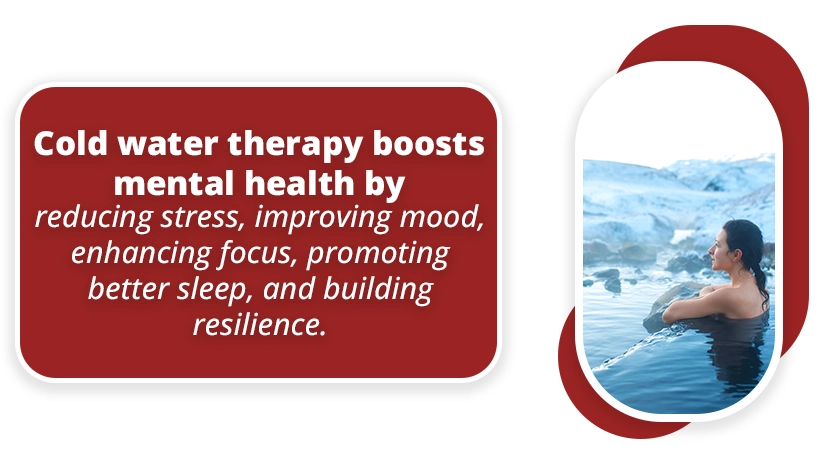
Benefits Of Cold Water Therapy For Mental Health
In recent years, cold water therapy has been gaining recognition for its potential benefits to mental health. This therapy involves immersing oneself in cold water, typically for short periods. While it may seem daunting at first, recent studies suggest it can offer various mental health advantages.
From reducing stress and anxiety to boosting mood and alertness, cold water therapy is believed to stimulate the central nervous system and trigger the release of endorphins, our body’s natural mood elevators. Keep reading as we explore the potential mental health benefits of cold water therapy.
Key Takeaways
Cold water therapy, involving exposure to water with colder temperatures, offers various good health benefits. This article covers:
- Cold water therapy includes practices like cold showers, ice baths, and swimming in cold water, all of which aim to improve well-being.
- Cold water therapy can enhance mood, reduce stress levels, and improve mental clarity and cognitive function.
- Cold water therapy can be a refreshing and beneficial practice, but it must be approached with care.
Indiana Center for Recovery offers comprehensive mental health services—contact us at (844) 650-0064 to start your journey to wellness.

Overview Of Cold Water Therapy
Cold water therapy, also known as cold water immersion or cold hydrotherapy, involves exposing the body to cold water for therapeutic purposes. This practice has ancient roots, with civilizations like the Greeks and Romans using cold baths for health benefits. Today, cold water therapy is gaining popularity due to its potential advantages for both mental and physical health.
There are several ways to practice cold water therapy:
- Cold Water Showers: Taking cold showers involves using water at a temperature lower than room temperature, typically around 68°F (20°C) or cooler.
- Ice Baths: Ice baths require submerging oneself in a tub filled with ice-cold water and ice cubes, with temperatures ranging from 50°F to 59°F (10°C to 15°C).
- Swimming in Cold Water: Swimming in cold water, such as lakes or oceans with water temperatures around 50°F (10°C) or lower, also qualifies as cold water therapy.
Each form of cold water therapy stimulates the body’s natural responses, such as increased circulation and reduced inflammation. It can also activate the sympathetic nervous system, resulting in a temporary boost in alertness and energy. These physiological reactions contribute to potential mental health benefits, including improved mood, better stress regulation, and increased resilience to everyday challenges.
Cold Water Therapy Impacts On Mental Health
Researchers say that cold water therapy offers various physiological and psychological benefits that can have a positive impact on mental health. Let’s explore these benefits:
Physiological Effects
Cold water immersion triggers several physiological responses that can benefit mental well-being:
- Improved Circulation: Cold water immersion constricts blood vessels, enhancing blood circulation and oxygen delivery throughout the human body, which can enhance overall brain function.
- Reduced Inflammation: Cold therapy helps reduce inflammation in muscles and joints, potentially alleviating discomfort that can affect mood and mental clarity.
- Boosted Immune Response: Exposure to icy plunges or cold showers can stimulate the immune system, contributing to better overall health and resilience against illnesses.
- Increased Alertness: The cold shock of water activates the sympathetic nervous system, leading to a significant increase in alertness and mental acuity.
- Pain Relief: Cold water therapy has analgesic properties, providing relief from pain and discomfort, which can positively impact mood and stress levels.
- Increased Metabolism: Regular cold baths can boost metabolism as the body works harder to sustain its core temperature, potentially aiding in weight management.
Psychological Effects
Beyond its physical benefits, cold water therapy also impacts mental health positively:
- Stress Reduction: Cold, icy water immersion can act as a stressor that helps the body adapt, which leads to a significant decrease in stress levels over time.
- Improved Mood: The release of endorphins and other neurotransmitters during cold water exposure can enhance mood and promote feelings of well-being.
- Increased Mental Resilience: Regular exposure to cold water can improve resilience to stressors, both physical and psychological.
- Enhanced Focus: Bathing or swimming in water with cold temperatures can sharpen focus and concentration, helping individuals tackle mental tasks more effectively.
- Better Sleep Quality: Cold water therapy’s calming effect can contribute to improved sleep patterns and deeper, more restorative sleep.
- Enhanced Mental Clarity: Cold water immersion therapy sessions can clear the mind and improve mental clarity, making it easier to focus on tasks and make decisions.
Integrating this type of treatment mindfully and gradually, under proper guidance, can provide people with a holistic approach to mental health maintenance and enhancement.
Potential Risks Associated With Cold Water Therapy
Cold water therapy can pose certain risks despite its potential health benefits. Here are some risks associated with cold water therapy:
- Hypothermia: Long-term exposure to cold water can lead to dangerously low body temperature, causing hypothermia. Symptoms include shivering, confusion, and drowsiness.
- Cardiovascular Stress: Cold water immersion can put stress on the cardiovascular system, potentially leading to increased heart rate and high blood pressure, especially in individuals with pre-existing chronic conditions.
- Drowning Risk: Cold water can impair muscle function and coordination, increasing the risk of drowning, particularly if the individual experiences muscle cramps or loses control of breathing.
- Skin And Nerve Damage: Prolonged exposure to cold water can lead to skin numbness, frostbite, or nerve damage, particularly in extremities like fingers and toes.
- Risk Of Panic Or Anxiety: For some individuals, the shock of cold water immersion can trigger panic attacks or exacerbate anxiety symptoms rather than alleviate them.
- Medical Conditions: People with certain medical conditions, like respiratory issues or heart conditions, should avoid cold water therapy unless under medical supervision.
- Contraindications: Cold exposure may not be suitable for pregnant women, young children, or elderly individuals due to increased susceptibility to temperature extremes.
Before engaging in cold water therapy or any form of alternative treatment for mental health, it’s crucial to consult with a healthcare professional to assess individual risks and benefits.
Practical Tips For Trying Cold Water Therapy
Cold water therapy can be a refreshing and beneficial practice, but it’s essential to approach it with care. Here are some practical tips to help you get started safely and effectively:
Getting Started Safely
Cold water therapy can be an effective way to boost mental health, but it’s crucial to start safely. Consult your doctor, especially if you have any health conditions. Start with short exposure times, like a 30-second cold shower, to help your entire body gradually adjust.
Wear a swimsuit or comfortable clothes you can easily remove when you get cold. Always have a warm towel and dry clothes ready for after your therapy session. It’s essential to listen to your body and avoid pushing yourself too hard, especially at the beginning.
Tips For Success
Success with cold water therapy often comes with preparation and consistency. Start by setting a regular schedule, aiming for consistency over intensity. Use breathing techniques to keep yourself calm and focused while in cold water; deep, slow breaths can help manage the shock and discomfort.
Gradually increase your exposure time as your body gets used to the cold. Joining a group or having a supportive individual can provide much-needed motivation and support. Celebrate small milestones to keep yourself motivated and track your progress to see significant improvements over time.
Safety Considerations
Safety should always be a priority when engaging in cold water therapy. Never go alone; always have someone with you or let someone know when and where you’ll be practicing. Avoid cold water therapy if you’re feeling unwell or have any heart or respiratory conditions unless cleared by your doctor.
Be aware of the signs of hypothermia, such as uncontrollable shivering, confusion, and drowsiness, and exit the water immediately if you experience any of these symptoms. Ensure the water you use is clean and safe, especially if you’re using natural bodies of water like a cold lake or river.
Integration Into Routine
Integrating cold water immersion therapy into your daily routine can make it a sustainable practice. Start by choosing a specific time of day that works best for you, such as during your morning shower or after a workout. Consistency will help your body acclimate and maximize the mental health benefits.
Combine cold water therapy with other wellness activities like meditation or yoga to enhance your overall mental well-being. Track your progress in a journal, noting how you feel before and after each session. Over time, you may notice reduced feelings of mood disorders and better stress management.
Incorporating these practical tips can help you safely and effectively integrate cold water therapy into your wellness regimen, enhancing both physical vitality and mental resilience.
Frequently Asked Questions (FAQ)
Cold water can help your mental health by triggering a response in your body that boosts mood and alertness. When you splash cold water on your face or take a cold shower, it stimulates blood flow and increases oxygen intake, which can make you feel more awake and focused.
It also activates the nervous system, releasing neurotransmitters like endorphins and adrenaline that improve mood and reduce stress. This refreshing sensation can provide a quick mental reset, helping to alleviate feelings of anxiety, depression, or fatigue and promoting a sense of rejuvenation and clarity in your mind.
Swimming in cold water can be beneficial for mental health. The shock of cold water triggers the release of endorphins, which can enhance mood and reduce feelings of chronic stress and anxiety. Cold water swimming also promotes better circulation, which helps with overall well-being and can increase energy levels.
It’s a refreshing experience that can boost mental alertness and clarity, making you feel more awake and focused. Moreover, regularly exposing yourself to cold water challenges can build mental resilience and confidence, enhancing your ability to deal with stressful situations and improve your overall mental health.



